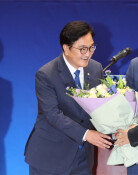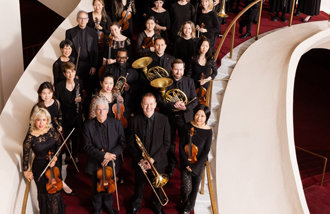Politicians Focus on Constitutional Reform
Politicians Focus on Constitutional Reform
Posted October. 25, 2005 07:25,
A revision of the Constitution is being openly and frequently discussed among politicians. At the National Assemblys interpellation session on the government Monday, half of the questioning lawmakers presented their opinions regarding constitutional reform.
Officially, the leaders from the ruling and opposition parties made an agreement that they would discuss constitutional reform after the local elections in June 2006. However, many politicians already started discussions.
They found a few suggestions in common and these were discussed during the interpellation session.
Most suggested that discussions should begin by late this year or early next year at latest so the National Assembly can pass the reform bill by late next year and put the reform bill to a referendum in early 2007.
Therefore, many forecast that as soon as the regular session of the National Assembly is over, the political circle will swiftly move to a situation to prepare constitutional reform, and that the move will be followed by political realignment, which is a persuasive observation.
The Sooner, The Better
Kwon Chul-hyun from the Grand National Party (GNP) suggested a discussion of the issue in this years regular session, and Chung Ui-hwa, another GNP lawmaker, argued that now was the time for full-scale discussions on constitutional reform by first setting up a special committee to reform the Constitution and election system.
Yu Phil-u from the ruling Uri Party also suggested starting discussions promptly. Min Byung-doo, another Uri Party lawmaker, strongly argued that a delay in full-scale discussions on constitutional reform after the local election next year could bring about rough-and-ready reform, and that discussions should start in January 2006 when the regular session of the National Assembly is over.
Five-Year Single Term Presidency Must Be Eliminated
Lawmakers from both ruling and opposition parties have agreed that the current five-year single term presidency system has revealed limitations since it was determined by the constitutional reform in 1987.
Both Yu and Chung suggested a four-year double term presidency with a vice-president system, instead of the current prime minister system. This, according to Yu, will promote the separation of power, relieve regional struggles, and maintain the consistency of government policies. Not only that, Yu argued, the nation would have a chance to enjoy good leadership longer.
Meanwhile, Yun Ho-jung from the Uri Party said, From a long-term perspective, provided that the Inter-Korea Commonwealth is a stage to manage the national defense of a reunited Korea in the future, the parliamentary government system is most desirable for South Korea.
Roadmaps for Constitutional Reform
Kwons roadmap for a revision of the Constitution is as follows: to first set up a workshop to study the Constitution for a year; to set up a special committee for a revision of the Constitution during the regular session of the National Assembly in 2006 and to discuss a revision; to pass a bill on the National Assembly on February 2007; to hold a national referendum in March 2007; to set up a government of national concentration by the government and a third Political Reform Council by the National Assembly; and to simultaneously hold the presidential election and general election in November 2007 (to hold a general election only in the case of a parliamentary government system).
Mins roadmap is to first establish a nationwide council for constitutional reform to study the Constitution, directly belonging to the National Assembly speaker, in January 2006, and then to set up a special committee for a revision of the Constitution and finalize a revision in late 2006. Mins suggested date for the national referendum is March 2007.
Dong-Yong Min mindy@donga.com






